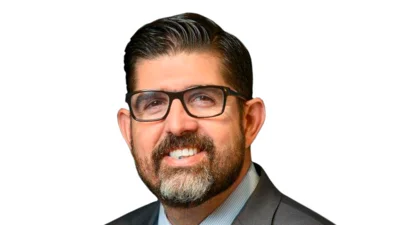Palm Beach Atlantic University issued the following announcement on Feb. 25.
Three dedicated students called their peers to pursue higher ideals of truth, justice and beauty in eloquent, nine-minute speeches informed by scripture.
The students — Jessica Lykins, Josmery Botello and Andrew Mercantini — were Q Union fellows, participants in the college chapter of Q Ideas. The Nashville-based nonprofit inspires young people nationwide to “recover a vision to renew and restore their culture” by wrestling with difficult topics.
Communication Professor Dr. Stephanie Bennett and Assistant Dean of Students Kate Magro selected the fellows from among a gifted group of applicants. Bennett serves as the students’ speech coach. Their peers, parents and faculty and staff packed the Weyenberg Center to hear their speeches last week.
Lykins, a senior communication major, began her talk, “In the Spirit of Veracity,” with the memory of the first time she told a lie. She was in elementary school, and she told a friend that she had a wristwatch that allowed her to talk directly with the president.
Veracity is truth-telling — being careful to share only what we know is true for the sake of others, Lykins said. Ephesians 4:25 gives Christians an especially high calling to speak and write the truth in a way that points people to Christ.
In the age of media consolidation, misinformation spreads farther faster, Lykins said. People’s first inclination is to look to the government to solve the problem. But it’s impossible for the government to enforce truth-telling without infringing on the right to speak freely.
Individuals have a communal responsibility to the truth. They are the solution, Lykins said.
“It is easy to fall into the trap of dishonesty and incivility,” Lykins said. “How do we expect to solve problems if we cannot have conversations about them?”
In her talk, “The Outside that Dreams,” Botello shared statistics and the story of how her mother came to the United States from the Dominican Republic to illustrate the dysfunction of the U.S. immigration system.
Botello’s mother was 12 years old when Botello’s grandfather submitted a visa application. Fifteen years, two children and a massage therapist license later, she got the phone call that she was approved.
The federal government provides billions of dollars for enforcement but only millions for the immigration court system, resulting in a backlog of deportation cases, Botello said.
Immigrants are less likely than native-born residents to be incarcerated and more likely to start their own companies. Botello, a junior psychology major, said she is the product of a woman who came to this country with a dream that her children would be able to build the lives they deserved.
Galatians 5:13 frees Christians to love others, rather than being self-serving, she said.
“Immigrants are humans created in the image of God,” Botello said. “It is our job to respond to these issues with justice, truth and love.”
In his talk “Beauty as Being,” Mercantini made the case that there is no justice without beauty.
“The goodness we pursue, the justice we want to enact depends on an image that is harmonious, ordered and beautiful in itself because God has made it so,” said Mercantini, a junior studying philosophy, politics and economics.
Humans have tried to make beauty into something that we confer based on our own value judgments, defying the idea that “beauty is in the eye of the beholder.” Beholding something means receiving it for what it is, not judging or evaluating it.
Beauty is “the catalyst of love, the very essence of our faith, which drives us toward God,” Mercantini said. When we contemplate God, it spurs us to love others abundantly because we see people as they are. In turn, because we see them as they are, we encounter the beautiful more and more.
“This new sight within us contemplates God all the more, and we’re moved to love anew again and again,” Mercantini said.
Original source can be found here.




 Alerts Sign-up
Alerts Sign-up